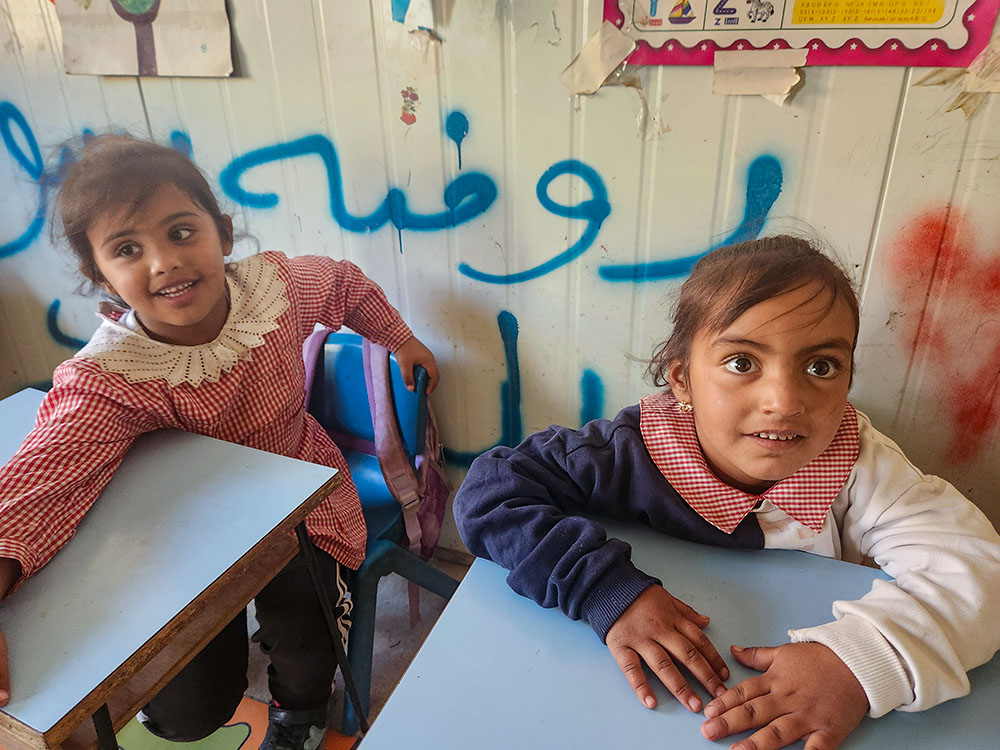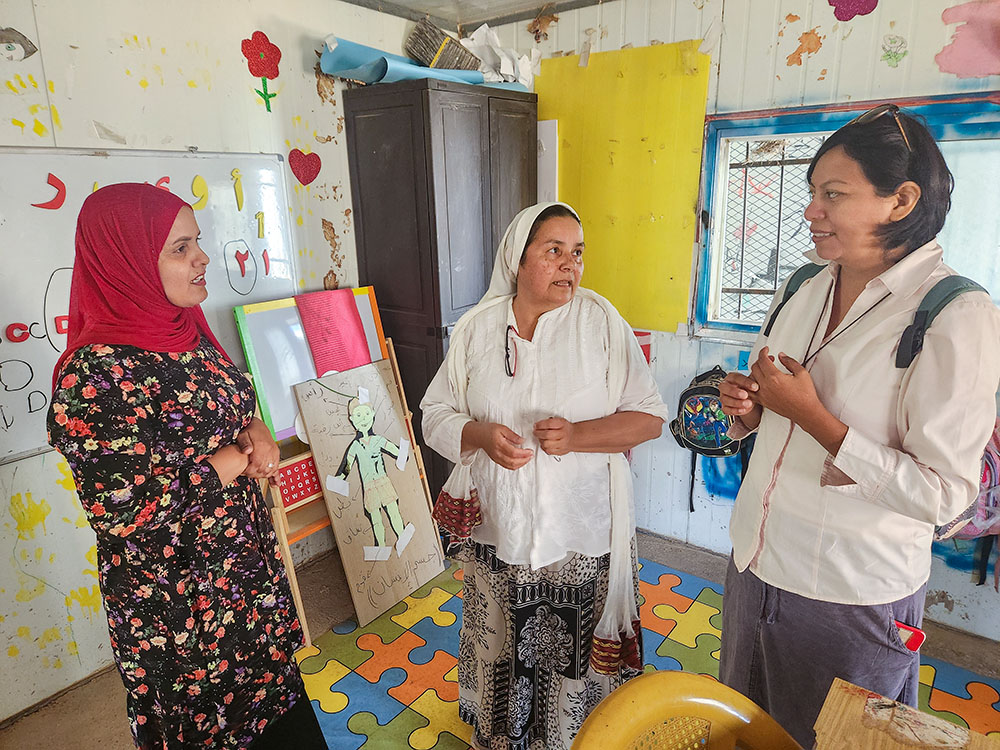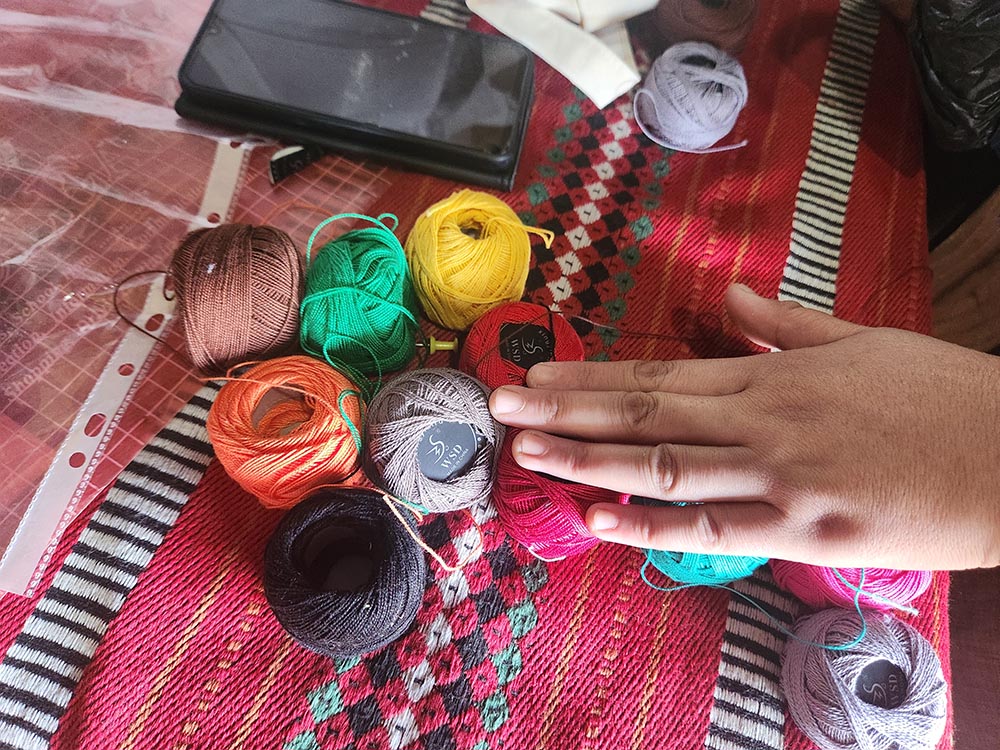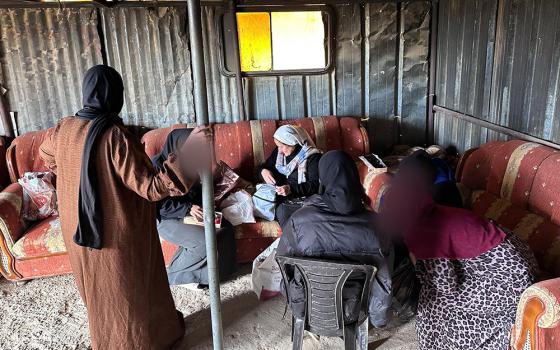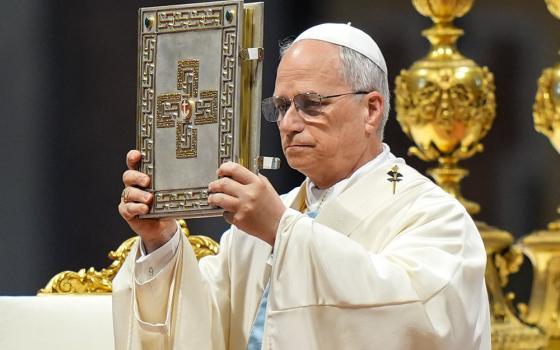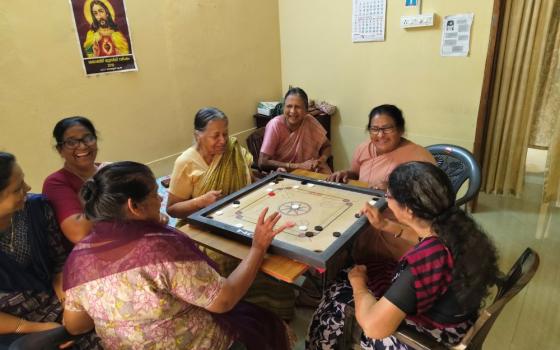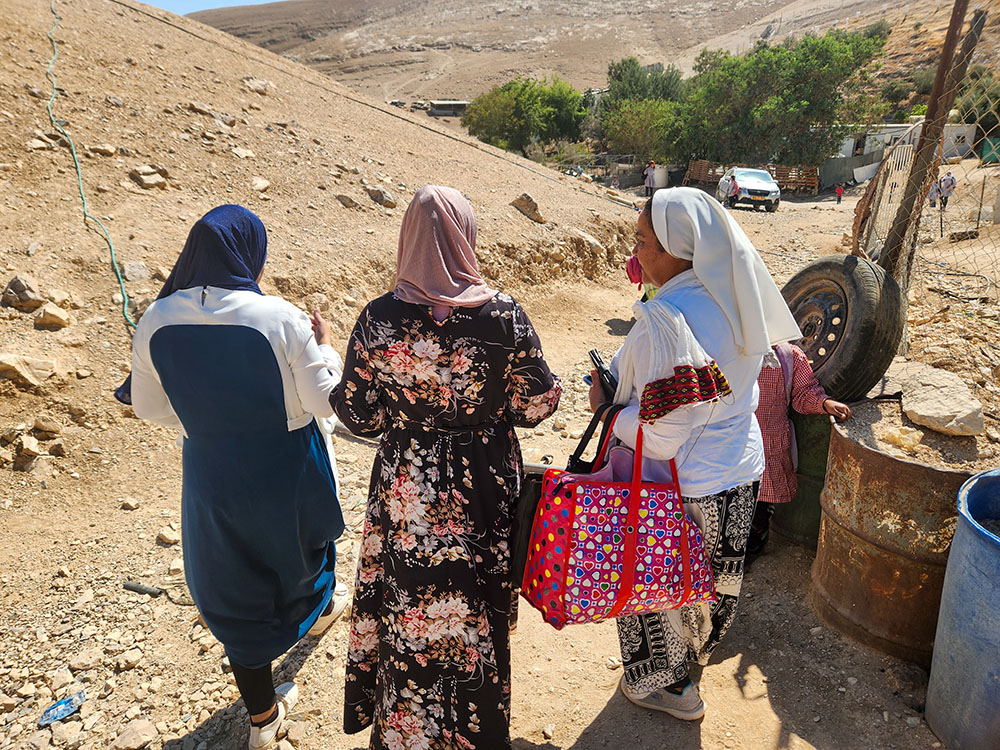
Comboni Sr. Cecilia Sierra, right, with two residents of the West Bank village of Abu-hindi. The Bedouin women did not wish to be identified in photos, worried about the potential harm that could pose to their communities. (GSR photo/Chris Herlinger)
With the sun blazing on a bright mid-October Saturday afternoon, Sr. Mariolina Cattaneo stood on the roof terrace of the main Comboni residence in East Jerusalem and pointed to the concrete separation wall — sometimes also called a separation barrier — just yards away.
She mused about the futility of building walls — in this case an edifice built to ensure Israeli security and, ironically, utilizing Palestinian labor. The segment near the Comboni residence was completed in 2009.
"In the end, walls don't separate," said Cattaneo, the interim coordinator for the small community of Comboni Missionary Sisters. "They only divide."
Cattaneo believes this barrier in particular — about 440 miles long, and twice as high in some spots as the Berlin Wall — will one day be dismantled as a relic from a sad moment. "It's one of those things that history will remember as not necessary at all," she said. "Senseless."
Her words hung in the air.
"It's heavy. It's sad. It speaks of something that cannot last. A division that will not last."
But right now, the divisions are potent and all too real. As proof, there are two groups of Comboni sisters based in the greater Jerusalem area — first in Bethany, or Al-Eizariya in Arabic, on the occupied West Bank, and second in East Jerusalem, which is also part of the West Bank but is claimed by Israel. (Israel occupies the entirety of Jerusalem, while the international community considers the annexation of East Jerusalem illegal.)
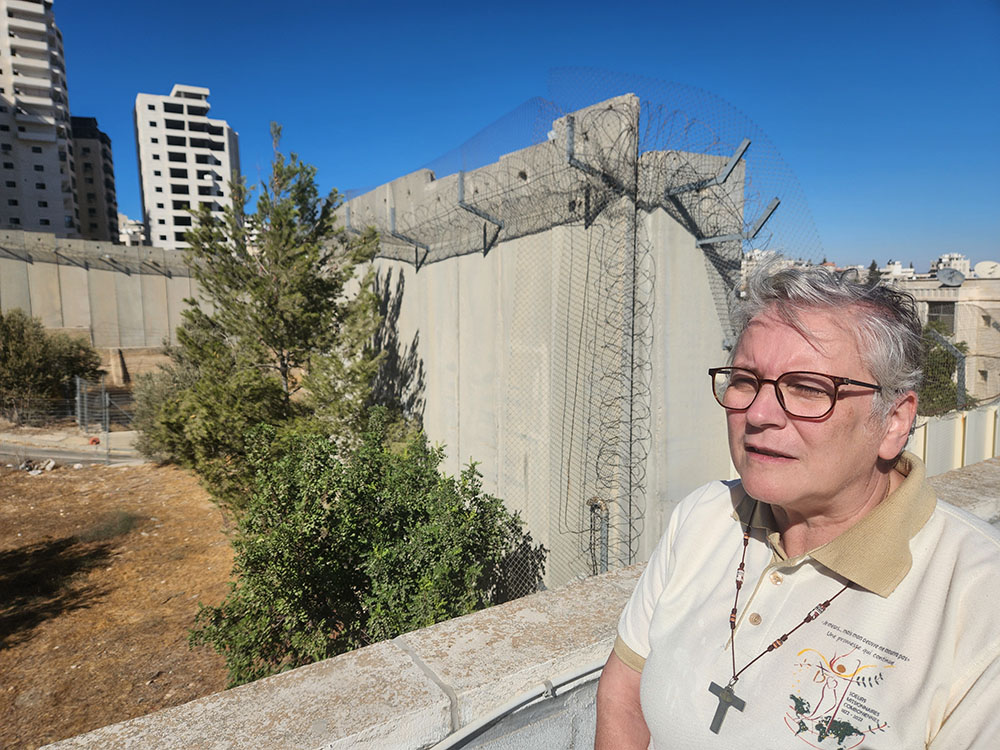
Comboni Sr. Mariolina Cattaneo on the roof terrace of the main Comboni residence in East Jerusalem, overlooking the concrete separation wall just yards away. The wall is about 440 miles long, and twice as high in some spots as the Berlin Wall. The segment near the Comboni residence was completed in 2009. (GSR photo/Chris Herlinger)
The separation wall forces the sisters to turn what should be a three-minute walk from one community to the other into an 11-mile journey by car or bus — one that, when traffic is heavy, can take up to two hours, said Sr. Cecilia Sierra, who is from Mexico. The delay is often worsened, she added, by the need to pass through a security checkpoint.
"It's one community, but we're divided by a wall," said Sierra who, along with Sr. Lourdes García, also from Mexico, ministers from Al-Eizariya.
But Cattaneo and the other Comboni sisters working in the Jerusalem area — there are seven in all, with five based at the residence in East Jerusalem and the two Mexican sisters based in Al-Eizariya — hope that their presence acts as a bridge in a divided land.
The sisters try in small but meaningful ways to create the kind of connection symbolized by Jesus' life, ministry and example, with a persistent belief that, as Cattaneo said, "If you build a wall, we find a solution."
"People always find ways to overcome walls, to overcome divisions," she said. "The question is now how to do that, to stop people from being afraid of each other. The only thing that makes sense is to have people talk to each other."
After Oct. 7, 2023, 'the world changed'
García said that in the midst of ongoing political and social tensions, the Combonis remain committed to nurturing hope through various ministries.
Before Hamas' brutal Oct. 7, 2023, attacks, abductions and murders of Israeli civilians, the sisters engaged in efforts to nurture dialogue between Jewish and Palestinian Christian women, such as hosting interfaith and intercultural exchanges at the Comboni residence.
Advertisement
But with the Gaza tragedy, everything stopped, the sisters said. They added that they are more than willing to shepherd such dialogue in the future. But for the moment, even with the shaky Gaza ceasefire, they say, continuing security concerns and wariness on both sides make that difficult.
Still, Cattaneo said, the possibility of reviving dialogue does exist, long-term. "We will in time," she said when asked if the sisters will try. "But can we say that the war is over? There is an [overall] effort, but rebuilding trust requires much more time."
"The world changed," García said of life since Oct. 7, 2023, but affirmed that one thing did not — the belief that "we are all the sons and daughters of one God."
For her part, Cattaneo regrets not being a part of those previous moments of dialogue. She arrived from Italy soon after the war in Gaza began and said both Jews and Palestinians "were in shock, both sides."
Sr. Lorena Sesatty, also from Mexico, recalls the earlier times fondly, saying people of different nationalities shared community life together for short- or long-term stays, emulating the international reality of the Comboni sisters themselves — the five sisters living in the East Jerusalem residence hail from Italy, Mexico and Egypt.
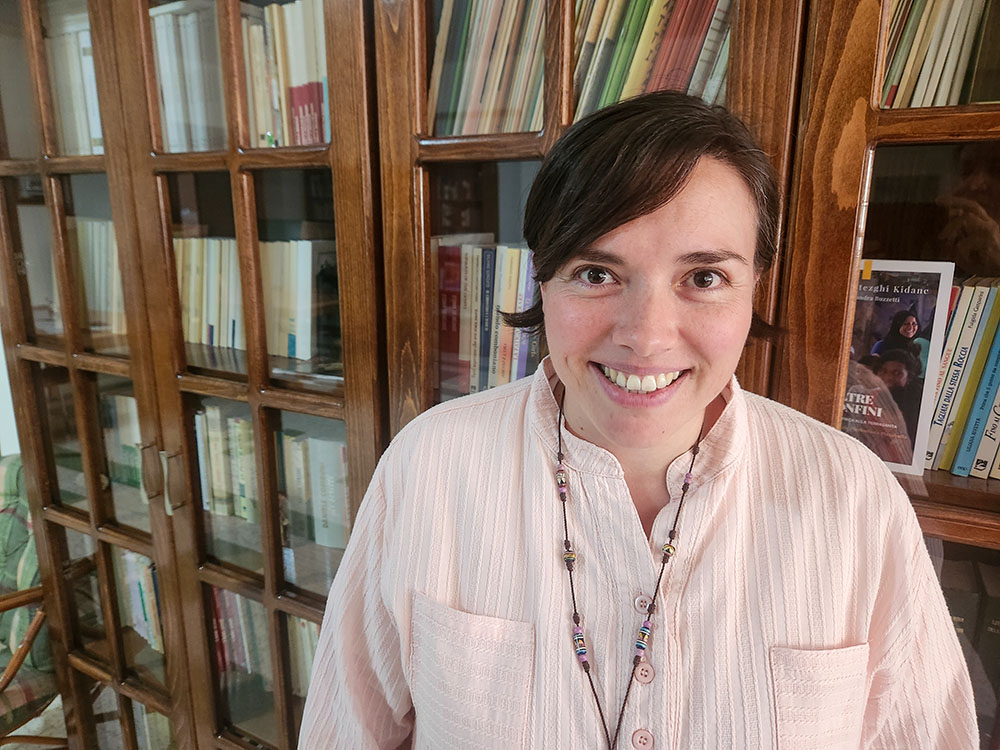
Comboni Sr. Lorena Sesatty, who is from Mexico, is a trained therapist and works in Bethlehem, West Bank, at a counseling service for families, couples and young people undergoing difficulties amid current social tensions. (GSR photo/Chris Herlinger)
In the meantime, the Comboni sisters' ministries continue despite the challenges facing the Holy Land.
Sesatty, a trained therapist, works in Bethlehem at a counseling service providing psychological support for families, couples and young people undergoing difficulties — not uncommon for residents of the West Bank. They face an economy in tatters, with many not permitted to return to jobs in Israel because they cannot renew their security permits, which are necessary for Palestinians.
There is "a heaviness right now," she said, born from the fact that many cannot work. "Anger and sadness are very connected."
Other concerns: mounting alcoholism and other chemical addictions, and "a crack of identity" — be it the difficulties of onetime rural residents now adjusting to life in urban areas, or the lived experience of the present reality.
"When you go into the communities," she said, "people are traumatized."
Lifeline 'keeps hope alive' in Bedouin communities
In their ministry in the West Bank, Sierra and García encounter that pain all the time — and it is a trauma that goes back decades.
The Comboni ministry based in Al-Eizariya dates from 1966, but entered a new era in May 2011 when, after the second intifada, the Bethany community launched its mission in the village of Al-Eizariya and in the Bedouin villages of the Judean Desert, located east of Jerusalem.
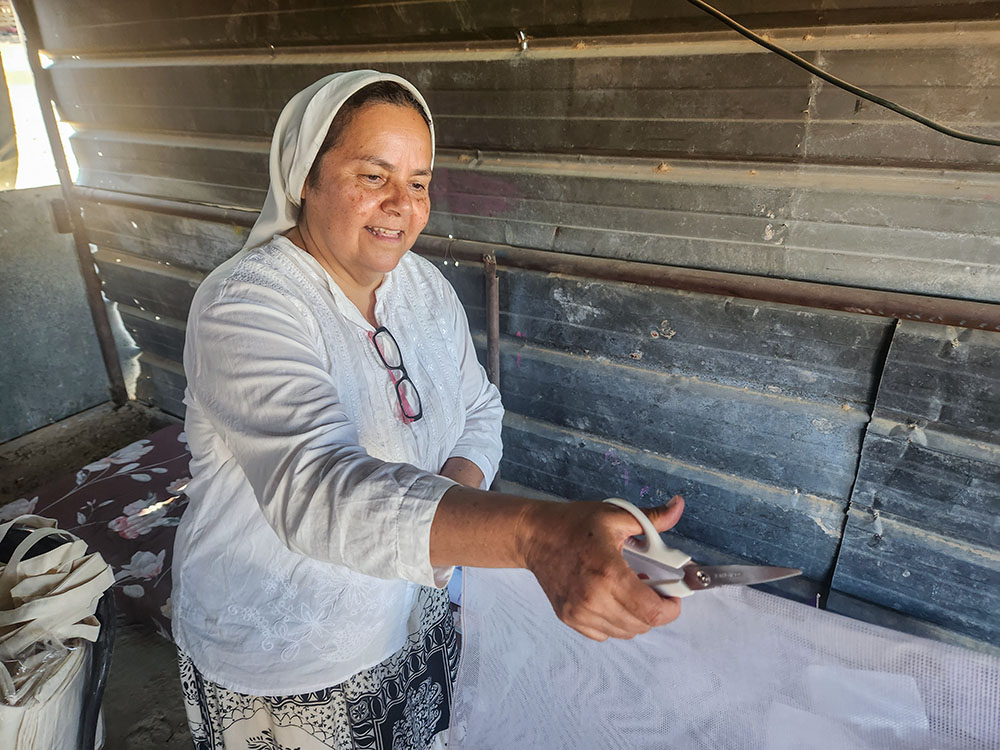
Comboni Sr. Cecilia Sierra prepares materials to be used for crafts made by Bedouin women in the West Bank village of Tabana. (GSR photo/Chris Herlinger)
That ministry, "Threads of Peace," now accompanies some 200 Jahalin Bedouin women living in 11 villages through workshops and providing tools, training and resources. The workshops help produce crafts and products, such as embroidery, sewing and soap-making, that provide welcome income for the women and their families.
"It is a vital lifeline that strengthens the communities and keeps hope alive," Sierra said.
One Wednesday morning on the way to three Bedouin villages, Sierra said working on the West Bank is a "textbook on so many things," including nothing less than what "it means to be human."
Given the legal restrictions faced by Palestinians and the particular hardships experienced by the Bedouins — nomadic peoples who are among the most vulnerable in Palestinian society — it is important to affirm the humanity of all, Sierra said. "You can't say one person is a human and another isn't," García added.
To García, working alongside the Bedouins undergirds the Comboni charism of ministering with the most vulnerable — stressing the importance of "us going to them."
"This is their place, not ours," she said.
The isolation and difficulties faced by the Bedouins were evident during the long day the two sisters spent at the three villages. The roads linking the Bedouin villages to main highways were rutted and uneven, challenging the durability of the sisters' small Subaru hatchback.
It was also uncommonly hot for mid-October, and the sunlight was pounding — bright and intense.
But once the sisters arrived, they were greeted warmly like family. They spent most of the time with village women on projects, such as producing Christmas cards and handmade crafts to be sold abroad as holiday gifts.
In the first village of Abu-hindi, though, the two sisters — García in particular — checked in with several teachers who provide primary education for both girls and boys, a commitment the congregation has carried forward for 15 years. The ministry was initiated by Comboni Sr. Alicia Vacas Moro, a Spanish missionary who was among the 14 recipients of the U.S. Department of State's International Women of Courage Award in 2021. (Vacas' current ministry is now in Rome.)
Sierra said before the initiative began, there were no schools in the Judean Desert, "and children walked long distances under the scorching sun to reach the nearest classroom." Responding to the request of the Bedouin communities, on behalf of the congregation Vacas and Eritrean Sr. Azezet Habtezghi Kidane "embraced the mission of education as a path to peace."
In Abu-hindi, 23 students ages 8-12 are learning the basics, and one of the teachers, who did not want to be identified, said that congregational support — including for some teacher training — is "important and good. Thanks to them we are able to teach."
During a tea and coffee break in one of the Bedouin homes, Sierra marveled at the friendships she and García have made. "We are part of the family and we're called aunts," she said over a cup of strong, espresso-like coffee.
In all three of the villages, the banter in Arabic was easy and the laughter warm. The women in Tabana, the second village on the day's itinerary, spoke of happiness over the apparent end of the war in Gaza.
But the warmth was also laced with an undercurrent of worry and anxiety. All three of the communities visited are faced with threats by Israeli settlers who make it known that they have designs on the Bedouins' land. (Other Bedouin villages on the West Bank have faced similar threats.) At Tabana, two Israeli fighter jets unexpectedly swooped overhead. At the third of the villages, Hathrura, surveillance cameras set up by authorities were a common sight.
And in all three of the villages, women delighted and ebullient to work with Sierra on crafts insisted they did not want their photographs or names published in any article by a visiting journalist.
"No, we don't want that," said one woman, worried about the potential harm that could pose to their communities.
Wisdom from the Apostle Paul
That fact pointed to ongoing divisions symbolized by the separation wall, a reality that Cattaneo, who is trained as a theologian, believes has potent biblical symbolism.
She noted that in the Letter to the Ephesians (2:14), the Apostle Paul, speaking of differences between Jews and Gentiles, said of Jesus: "For he is our peace; in his flesh he has made both groups into one and has broken down the dividing wall, that is, the hostility between us."
In that spirit, Cattaneo believes that the hatred displayed by ideologues will ultimately dissipate. And that the "normal people" — Jews and Palestinians who can share a laugh or joke on the street, as she has witnessed — will be able to create, perhaps imperfectly, a functional coexistence, if not peace.
She thinks Christians — including Palestinian Christians — are in some ways best suited to help that along because part of their identity transcends and "goes beyond national borders."
"Being Christian means you are part of something universal," she said.
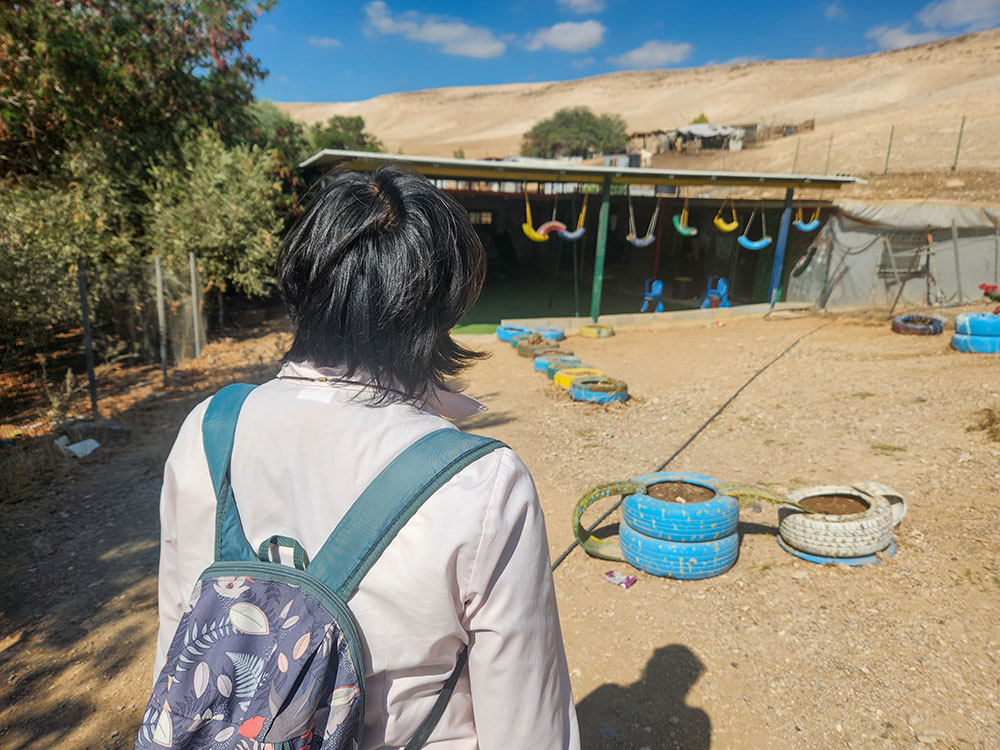
Comboni Sr. Lourdes Garcia on her way to the Bedouin West Bank community of Al-Eizariya (GSR photo/Chris Herlinger)
For the sisters working in the Bedouin villages, it is important to be seen "as the face of the church, as points of encounter," García said. "That is beautiful for us." More broadly, she added, it is important not to be overtly political but to "always be on the side of justice."
That and to affirm to the Bedouin communities that "God loves them, that God is still here, that God wants them to live a better life."
Faced with the fragile and often fraught relationships common right now in the Holy Land, people of goodwill on each side, Cattaneo said, represent "a seed of a peace process."
Peace activists are still very much in the minority in Israel, she cautioned.
"For groups working for peace, it's hard to break the [dominant] narrative." What Cattaneo called a "culture of separation" is still very much a reality.
"But thanks be to God that groups committed to peace and dialogue are here."
The Comboni sisters among them.
Editor's note: GSR international correspondent Chris Herlinger recently visited the West Bank as a member of a delegation of journalists and scholars sponsored by the Jerusalem-based Sabeel Ecumenical Liberation Theology Center. That visit was augmented by additional reporting in Israel and the West Bank.

